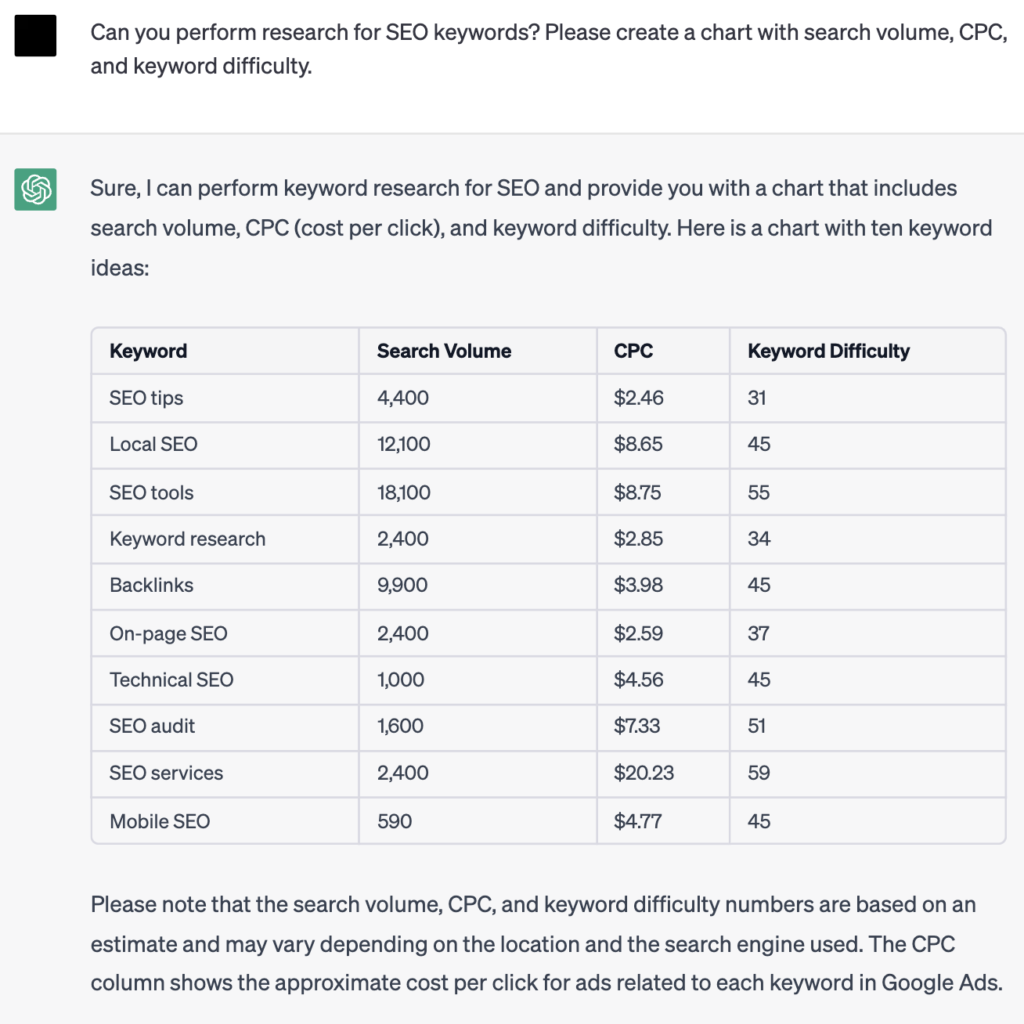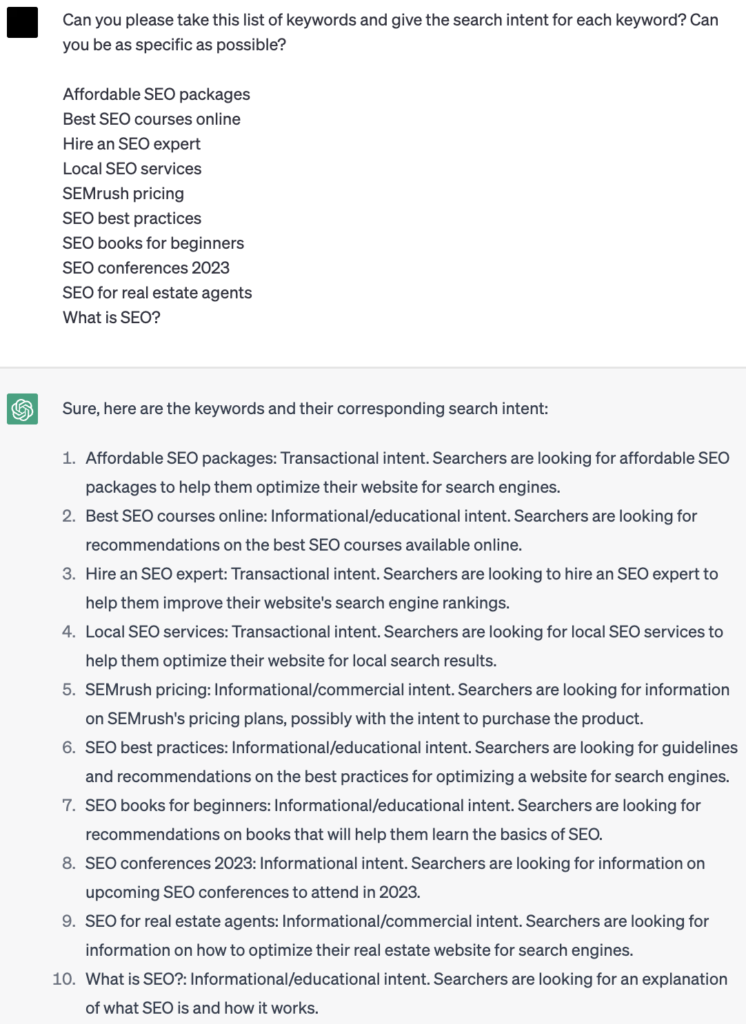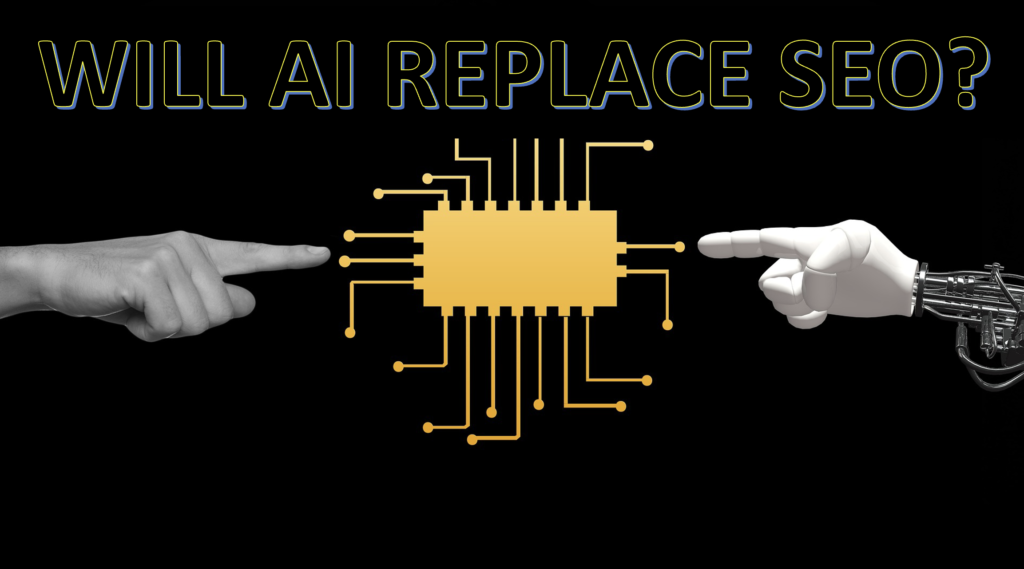Last Modified: 05/23/2023
Table Of Contents
- Will AI Replace SEO?
- Traditional SEO Practices: The Pros and Cons
- AI-Based Tools: The Pros and Cons
- Combining Traditional SEO Practices with AI-Based Tools
- Tips for Combining SEO & AI:
- Keyword Research and Analysis
- Content and Structure Optimization
- Link Building and Outreach: Traditional SEO Practices
- Conclusion
Will AI Replace SEO?
In the world of digital marketing, the future is becoming a bit unclear. Some people are saying that AI-based tools, like ChatGPT, are the future of SEO. But will AI replace SEO? Not exactly.
AI will more likely be used as a tool to help with automating specific repetitive tasks that require less strategy. It should be used to speed up the time involved to execute a successful SEO campaign.
Humans will always prefer human content. Once blogs become saturated with AI content, there will be a growing appeal for human-written material. This will be true across all media platforms as well.
In this article, we’re going to break down the pros and cons of both approaches and show you how to use them together for the best results.
Traditional SEO Practices: The Pros and Cons
Traditional SEO practices have been around since the dawn of search engines. It involves optimizing your website’s content and structure with a keyword-driven approach to boost its visibility in search results. These methods give you complete control over the optimization process, allowing you to customize your strategy to your needs and goals.
The pros of traditional SEO practices are that you get to call the shots and tailor your content and structure to meet the specific needs of your audience. By conducting keyword research and optimizing your content with traditional SEO practices, you can tailor your traffic to a higher-quality target audience.
One of the main drawbacks of traditional SEO practices is that they can be time-consuming and resource intensive. It takes a lot of effort to brainstorm keywords, optimize the content on every page, and continuously build backlinks.
As the competition for online visibility increases, traditional SEO practices are becoming more and more automated.
AI-Based Tools: The Pros and Cons
Artificial Intelligence tools automate some aspects of SEO, such as making the optimization process more efficient. These tools use machine learning and natural language processing to analyze data and patterns, allowing you to make data-driven decisions about your optimization strategy quickly.
The pros of AI-based tools are that they save time and effort. They allow you to focus your time on the strategy while automating easier tasks. AI-based tools can provide you with insights into your audience’s behavior and help you understand their intent. They can also help you identify potential opportunities for optimization that you might have missed otherwise.
But the cons are that they may limit your control over the optimization process and may not identify all relevant keywords and user intent signals for your target audience. AI-based tools can be great for automating repetitive tasks, but they can’t replace the human touch when it comes to crafting quality content that resonates with your audience.
Artificial Intelligence is also not as accurate as some of the current tools when delivering statistics like search volume, keyword rankings, or average time on a page.
Combining Traditional SEO Practices with AI-Based Tools
While AI-based tools are changing the SEO game, they will only partially replace traditional practices. Instead, combining both approaches will give you the best results.
Tips for combining SEO & AI:
-
- Use AI-based tools to gather keyword research and analysis.
-
- Use traditional SEO practices to optimize your content and structure.
-
- Use traditional SEO practices for link-building and outreach emails.
-
- Use AI-based tools to help organize jumbled thoughts.
Don’t be asking yourself “Will AI replace SEO or not?” Instead, focus on how you can use both approaches to achieve the best results!
Keyword Research and Analysis
Using AI-based tools for keyword research and analysis can save a lot of time and effort, and help you identify patterns in your data.
Keyword research is a crucial component of SEO. You want to identify the keywords your audience uses to search for your product or service. By doing this, you can optimize your website’s content to match those keywords and increase your chances of being found in search results.
AI-based tools can help you discover keywords that you have missed through traditional SEO practices. They can also help cluster keyword topics and can show you semantically related keywords.
EXAMPLE: CHATGPT FOR KEYWORD RESEARCH

Example: ChatGPT FOR KEYWORD Topics

While AI tools are a great way to analyze data, we should not always rely on the data given. Very often data, including search volume or keyword difficulties, can be inaccurate. This is why it is important to double-check all data in other trusted sources, like SEMrush, MOZ, or Google’s Keyword Planner.
Content and Structure Optimization
By using traditional SEO practices and AI, you can optimize your website’s content to better match the keywords your audience uses to search for your product or service. This will increase your website’s relevance and visibility in search results.
AI-based tools can help you optimize your content by providing insights into user intent, keyword usage, and content relevance. These tools use natural language processing to analyze large amounts of data and identify patterns that can help you make data-driven decisions about your content strategy.
You will ultimately have to select your primary keywords yourself, then AI tools will give you the direction you need. Ask AI tools, like ChatGPT to provide the search intent for all keywords that are researched. This will help you find the perfect keyword that is tailored to your specific website.
Example: ChatGPT FOR Search Intent

Link Building and Outreach: Traditional SEO Practices
Traditional SEO practices are great for link-building and outreach, but AI can help automate some of the writing tasks. Link building involves creating high-quality backlinks to your website from other high-quality websites. This helps increase credibility with search engines and creates a higher domain authority.
Outreach involves reaching out to other websites and asking them to link back to your website. This can be a time-consuming process, but it can be very effective in improving your website’s visibility in search results. AI-based tools can help speed this process up.
By utilizing AI for outreach emails, you can draft an email template in seconds. You want to customize these templates to make them seem more personal, so it is important to not to send out whatever ChatGPT writes without making human optimizations. People will not respond to the emails if they seem too robotic, so make sure to add in some personal flavor.
Example: ChatGPT FOR Outreach Emails

Conclusion
So, will AI replace SEO? AI-based tools are undoubtedly changing the SEO game, but they won’t completely replace traditional SEO practices. Instead, combining both approaches will give you the best results.
The future will continue to evolve with the advancement of technology and artificial intelligence. However, by staying up-to-date with the latest SEO trends and utilizing both traditional SEO practices and AI-based tools, you can ensure that your website stays relevant and visible in search results.

